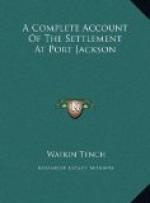[In the close of the year 1788, when this settlement was established, the thermometer has been known to stand at 50 degrees a little before sunrise, and between one and two o’ clock in the afternoon at above 100 degrees.]
’The hours of labour for the convicts are the same here as at Sydney. On Saturdays after ten o’clock in the morning they are allowed to work in their own gardens. These gardens are at present, from the long drought and other causes, in a most deplorable state. Potatoes, I think, thrive better than any other vegetable in them. For the public conveniency a baker is established here in a good bakehouse, who exchanges with every person bread for flour, on stipulated terms; but no compulsion exists for any one to take his bread; it is left entirely to every body’s own option to consume his flour as he pleases. Divine service is performed here, morning and afternoon, one Sunday in every month, when all the convicts are obliged to attend church, under penalty of having a part of their allowance of provisions stopped, which is done by the chaplain, who is a justice of the peace.
’For the punishment of offenders, where a criminal court is not judged necessary, two or more justices, occasionally assemble, and order the infliction of slight corporal punishment, or short confinement in a strong room built for this purpose. The military present here consists of two subalterns, two sergeants, three corporals, a drummer, and twenty-one privates. These have been occasionally augmented and reduced, as circumstances have been thought to render it necessary.
Brick-kilns are now erected here, and bricks manufactured by a convict of the name of Becket, who came out in the last fleet, and has fifty-two people to work under him. He makes 25,000 bricks weekly. He says that they are very good, and would sell at Birmingham, where he worked about eighteen months ago, at more than 30 shillings per thousand.




